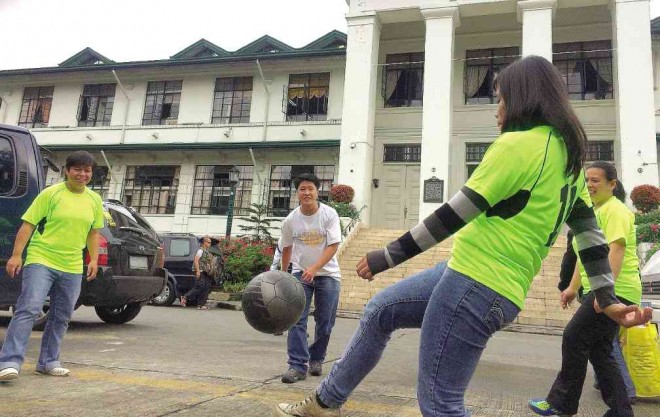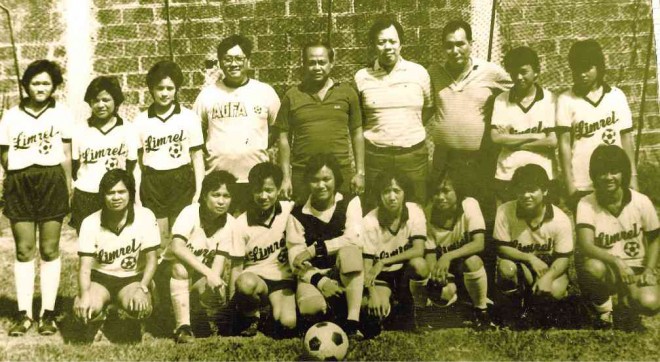In Baguio City, ‘Cinderellas’ keep football hopes alive

THE PIONEER team, represented in the photo by Anna Umoc-Cabanilla (far left) and sister Evangeline (far right), is now composed of a second-generation lineup represented by Melodia Bucahan, and a third generation line up represented by Cabanilla’s daughter Jana. VINCENT CABREZA/INQUIRER NORTHERN LUZON
BAGUIO CITY—The women of the Cabanilla family here have been staying up late at night in the past weeks to watch television broadcasts of this year’s World Cup.
“The matches are shown at 2 a.m., so [my children and I] bundle up and try to stay awake. It’s a family obsession,” said Anna Liza Umoc-Cabanilla, a football coach at a local university.
More than 20 years ago, Anna and her sister, Evangeline Umoc, were members of the city’s first ladies’ football team.
The 15-member team was composed of high school girls who had no sponsors, so they sometimes saved their stipends to hire a passenger jeepney that would take them to invitational games or community league matches in the provinces during weekends.
Because their trips were sparsely funded, Cabanilla’s mother would cook a hefty amount of adobo, which sustained the girls during the weekend matches. They had little money for hotels, so they slept inside the jeepney.
Article continues after this advertisement“On Sundays, their jeepney would be traveling back up to Baguio City, the girls snoring like [well-fed livestock] as they embraced their trophies,” said Ramon Dacawi Jr., the team’s manager.
Article continues after this advertisementMany Baguio newspapers conjured up images of shoeless football players in stories about the Baguio Ladies’ Football pioneers, known here by their moniker, the “Baguio Cinderellas.” Some of the girls went to matches in rubber slippers because they could not afford the standard footwear.
“That was partly true,” said Cabanilla. “But we did not grow up dirt poor. We ate three meals a day at home. We just couldn’t spend for the logistics of playing the sport … We came wearing whatever we were given by our ‘fairy godmothers.’”
The Cinderellas’ first victory of note was during the 1991 YKL-Fuji National Cup, to which the girls shuttled to and from Baguio after classes.
The pioneers were then recruited by Manny Javellana, a Brent School football coach.

HIGH school students formed the city’s first women’s football team in the 1990s and won accolades for beating the competition in most of their matches while using hand-me-down equipment and footwear, earning them the nickname “Baguio Cinderellas.” This photo shows the team after winning their first trophy in a 1991 match. CONTRIBUTED PHOTO
The Umoc sisters (Anna Liza and Evangeline), the Jacinto sisters (Monique and Julie) and the Pacubas sisters (Meriam and Luzviminda, who still serves as the goalkeeper of the Philippine National Futsal Women’s Team), were joined by Virgie Tibaldo-Bungay, Teresita Teodoro, Beverly Oloan, Rowena Salcedo, Elena Mendoza, Marlene Salenga, Marissa Linang, Grace Carrera and Lorena Cacayuran.
Dacawi said Javellana appeared to have been on a quest to revive a sport that Baguio used to love in the 1970s and 1980s.
University football matches used to be Sunday events for families out on picnics in Burnham Park, he said.
Many people soon contributed to the quest, some coaching, others driving the team to their matches.
Dacawi said keeping “fairy godmothers” had been hard. The Cinderellas, he said, took home the 1993 National Ladies’ Football Cup trophy but had to give it up to another team the following year because it could not raise enough money to fly to Davao City and defend the title.
Melodia Bucahan, 35, who belongs to the Cinderellas’ second-generation lineup, said the Baguio team regained the title in the 1995 tournament in Laguna province.
The pioneer team began to disband in the mid-1990s because many had to pursue new careers. Some went abroad but have kept in touch online with Cabanilla and her sister Evangeline, who both still take charge of the Cinderellas’ current lineup, which is composed of third- and fourth-generation players, including the pioneers’ children.